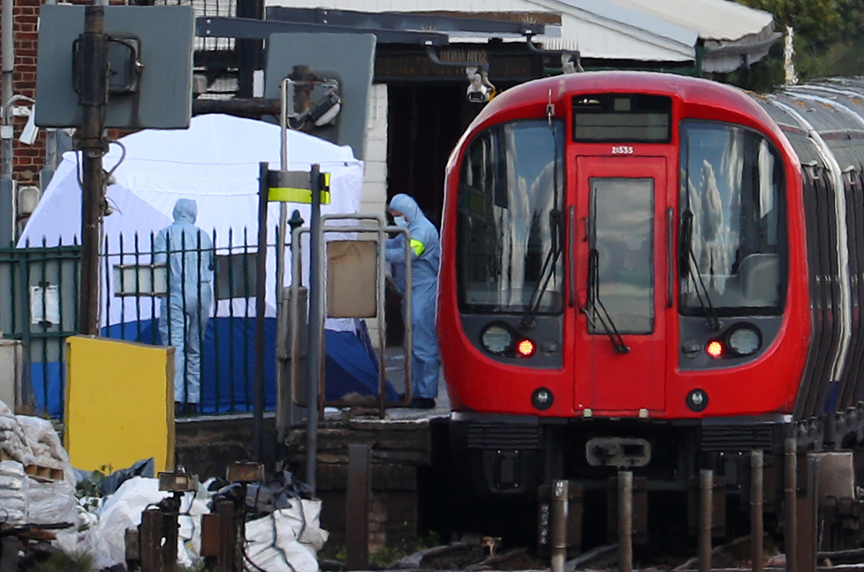 In a reaction that is sure to bolster the narrative of those claiming responsibility for the attack, US President Donald J. Trump released a series of tweets labeling the incident at London’s Parsons Green subway station on September 15 an act of terrorism before British authorities had done so. Trump claimed, among other things, that Scotland Yard had failed to identify and prevent the attack and that the solution was to “cut off” the Internet and make his travel ban to the United States “far larger, tougher, and more specific.”
In a reaction that is sure to bolster the narrative of those claiming responsibility for the attack, US President Donald J. Trump released a series of tweets labeling the incident at London’s Parsons Green subway station on September 15 an act of terrorism before British authorities had done so. Trump claimed, among other things, that Scotland Yard had failed to identify and prevent the attack and that the solution was to “cut off” the Internet and make his travel ban to the United States “far larger, tougher, and more specific.”
The perceived success of a terrorist attack is a subjective measure, filled with uncertainties and spin, and partly dependent on the level and type of coverage it receives in the media—this includes the reactions of world leaders and the effect those words have on their countries’ populations.
As non-state terrorist organizations are no match for nation states on a military level, they have increasingly turned to social media to broadcast their “victories” and magnify their impact. An organization such as the Islamic State of Iraq and al-Sham (ISIS), for example, thrives on the polarization of Western societies; its narrative is predicated on the notion that Muslims are not part of the countries where they were born or immigrated to, and that they will always be viewed by their non-Muslim counterparts as “the other.” Studies have shown time and again the tangible and negative effects of these dehumanization tactics on a society to include society as a whole becoming vulnerable to exploitation by extremists.
In contrast to Trump’s response, British leaders sought to provide assurances to the public, just as they had done after previous incidents—particularly before a motive or suspect had been identified. British Foreign Secretary Boris Johnson reminded the public that “it would be wrong to speculate” and that “the authorities were on it.” London Mayor Sadiq Khan, the city’s first Muslim mayor, tweeted that the city “utterly condemns the hideous individuals who attempt to use terror to harm us and destroy our way of life.” He also stated that (London) “will never be intimidated or defeated by terrorism” and urged Londoners to remain “calm and vigilant.”
Once London police declared the incident at Parsons Green an act of terrorism, British Prime Minister Theresa May tweeted, “my thoughts are with those injured at Parsons Green and emergency services who are responding bravely to this terrorist incident.” May also criticized Trump’s responses as “unhelpful.”
As offers of condolences began to pour in from other world leaders, many of whom simply expressed support for London, Trump’s tweets stood out as both alarmist and unrealistic in their policy prescriptions. This is not only problematic from a diplomatic point of view, it also bodes ill for the prospects of countering radicalization and violent extremism in what is surely going to be a multi-generational fight.
The immense discrepancy between the responses of the British and that of Trump, combined with what social science and psychology tells us about the pitfalls of dehumanization, illustrates why the US president’s pre-emptive tweets will likely do more harm than good. Like any world leader, the American president’s words are not just his own. His words, combined with the actions of the United States and those of its allies, comprise an entire narrative that, when used correctly, can help neutralize the sensationalism of extremist organizations. A narrative where the United States publicly creates fissures with our allies and partners, and enacts policies that harm the cohesion of those alliances, makes us all weaker.
Jasmine El-Gamal is a resident senior fellow with the Atlantic Council’s Brent Scowcroft Center on International Security. You can follow her on Twitter @jasmineelgamal.
Kathryn Elliott is a project assistant in the Atlantic Council’s Foresight, Strategy, and Risks Initiative.
Image: Forensic investigators searched the platform at the Parsons Green Underground station in London on September 15 after a crude bomb exploded on a packed train. The Islamic State of Iraq and al-Sham (ISIS) claimed responsibility for the bombing. (Reuters/Hannah McKay)
